

A rising South Korean presidential hopeful in the opposition bloc raised doubts about the capability of Terminal High Altitude Area Defense (THAAD) and the possibly hidden aim behind the agreed-upon deployment of the U.S. missile defense system in South Korean soil.
Lee Jae-myung, mayor of Seongnam, a city to the southeast of capital Seoul, told foreign correspondents in Seoul that the U.S. anti-missile system would never help South Korea defend its metropolitan area from the Democratic People's Republic of Korea (DPRK)'s missile attacks.
Seoul and Washington agreed in July to install one THAAD battery by the end of next year in southeastern South Korea. Given the limited intercepting capability, THAAD interceptors are incapable of reaching the capital city and its adject areas, where about half of the country's 50 million population reside.
DPRK missiles targing the South Korean territory are known to fly at a much lower altitude than the one at which THAAD interceptors travel, bolstering doubts about the U.S. missile shield's capability to shoot down missiles from the northern neighbor.
The United States, the mayor said, wants THAAD deployed in South Korea as part of its missile defense strategy in Northeast Asia, but his country will suffer from losses rather than make gains in consideration of the damaged ties with China.
Mayor Lee said China has opposed the THAAD deployment as it sees the THAAD's X-band radar as a kind of eye that can peer into Chinese territory in cooperation with Japan and the U.S.
He argued for South Korea's adoption of an indepeedent, balanced diplomacy between China and the U.S., saying Seoul should refrain from siding with one party.
Seoul needs to expand and develop its alliance with Washington, but the country should not give up its relations with China by pushing through the THAAD installation, the mayor of the biggest opposition Minjoo Party said.
Touching on the agreement reached last December between South Korea and Japan on so-called comfort women, Lee called for a thorough re-examination of it that was against the will of the comfort women victims and caused strong public objections.
The victims of comfort women, a euphemism for Korean women who were lured or forced into sexual slavery for Japanese military brothels during World War II, demanded the agreement be cancelled and called for Japan led by Prime Minister Shinzo Abe to sincerely apologize for and take legal responsibility for past atrocities.
Mayor Lee expressed his objection to the signing of the South Korea-Japan accord to directly exchange military intelligence on the DPRK's nuclear program, saying Japan has yet to eliminate its military hostility against South Korea.
The bilateral military intelligence pact was inked on Nov. 23 despite strong oppositions here from the parliament and the public. Historical and territorial disputes between Seoul and Tokyo are going on as the Abe-led cabinet is increasingly leaning toward the militaristic ambition.
The mayor said Japan has yet to make a sincere apology for its past aggression of the Korean Peninsula, which had been placed under the 1910-45 Japanese colonial rule.
He pointed out the neighboring country's repeated territorial claims over Dokdo islets, called Takeshima in Japan, which South Korea retrieved following its liberation from the Japanese colonization.
Regarding his country's policy toward the DPRK, Lee said South Korea must take all available measures, including dialogue and negotiations as well as pressure and sanctions, to defuse tensions on the peninsula.
For the past decade when the South Korean government under President Park Geun-hye and her predecessor Lee Myung-bak only adopted a hard-line policy, the DPRK's nuclear capability ironically advanced at a faster pace, the mayor noted.
If he is elected as next South Korean president, Lee said he will sit down face-to-face with top DPRK leader Kim Jong Un, adding that the DPRK is a counterpart with which South Korea should co-exist and ultimately unite even though it is currently hostile with South Korea from the military perspective.
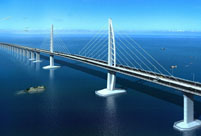 Top 10 Chinese tech and engineering marvels
Top 10 Chinese tech and engineering marvels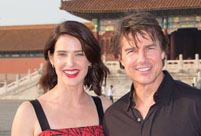 Tom Cruise in Palace Museum
Tom Cruise in Palace Museum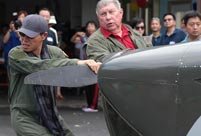 Home-made plane completes test flight in Chicago
Home-made plane completes test flight in Chicago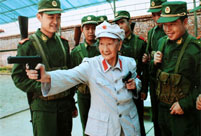 The untold stories of women in the Long March
The untold stories of women in the Long March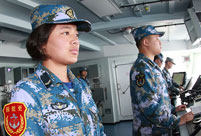 Female soldiers on Frigate Jingzhou
Female soldiers on Frigate Jingzhou Top 10 most beautiful Chinese athletes in Rio
Top 10 most beautiful Chinese athletes in Rio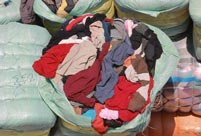 Shenzhen seizes 549 tons of illegally smuggled clothing
Shenzhen seizes 549 tons of illegally smuggled clothing Chinese actor Wang Baoqiang divorces wife, fires manager
Chinese actor Wang Baoqiang divorces wife, fires manager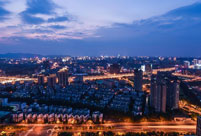 Hangzhou: host city of G20 Summit
Hangzhou: host city of G20 Summit Top 10 livable Chinese cities
Top 10 livable Chinese cities 10 Chinese cities with most beautiful night view
10 Chinese cities with most beautiful night view Top 10 summer resorts in China
Top 10 summer resorts in China Top 10 most competitive Chinese cities
Top 10 most competitive Chinese cities First PPP-funded high-speed rail construction starts
First PPP-funded high-speed rail construction starts  Taiwan risks full 'diplomatic' isolation under DPP rule
Taiwan risks full 'diplomatic' isolation under DPP rule  Illegal immigrants from Fujian unable to visit family due to deportation fears
Illegal immigrants from Fujian unable to visit family due to deportation fears  Thousands visit Mao's hometown in Hunan Province to mark leader's birthday
Thousands visit Mao's hometown in Hunan Province to mark leader's birthday